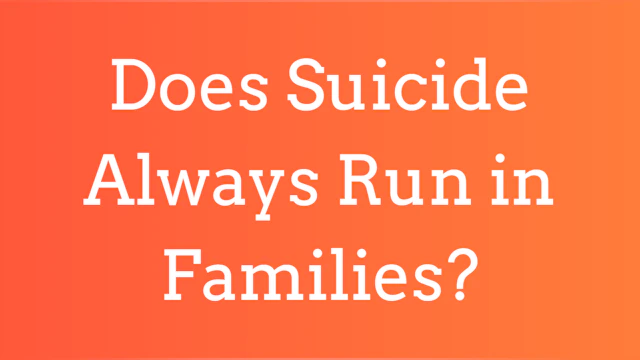Dear Dr. Jill,
My dad took his life a little over four years ago. I found him and since he didn't leave a note, there were a lot of unanswered questions. Does suicide always run in families? My life is so empty without him, and so many things trigger thoughts of that night. Will this ever get better? If you don't care if you live or die, but are not suicidal, is that a concern?
I am saddened to hear of the loss of your father by suicide. Suicides don’t always run in families and one or more family members dying by suicide does not mean everyone in the family will. Genes have been found to play a role, though we do not yet know the full story. For example, stress genes that relate to resilience, sensitivity to stress, and the ability to recover quickly from stress have been found to be related to suicidal behavior. Genetics may contribute to suicidal behavior, but a person’s environment also plays a part.
While some families experience multiple deaths by suicide and there may be some genetic components, no one is destined to die by suicide. Suicide is complex and there is never any one single cause. In other words, no one takes their life simply because they’ve lost their job or are going through a divorce. Generally when someone dies by suicide, it can be attributed to a combination of various risk factors, such as having a mental health condition, contending with chronic physical pain, substance use problems, stressful life events, and others. A family history of suicide is one of these risk factors. Suicide happens when a confluence of these factors are present, often in the face of stress and with lethal means accessible.
So while there may be a genetic risk for suicide, other health and life factors would also need to be present. Like any other hereditary physical health condition (like a family history of heart disease), it is important to carefully monitor mental health. Tools for managing suicidal thoughts and behavior, and maintaining a sense of well-being, can be developed in treatment. It can be beneficial to engage with a therapist before there is an emergency, so the therapist is familiar with one’s background, and can intervene if a problem should arise.
As for the other part of your question, loss of interest in life and not caring if you live or die at the very least is a sign of distress and needs to be taken seriously. Such feelings can signal suicide risk or other mental health concerns such as depression, anxiety, post-traumatic stress or complicated grief. In order to know what such thoughts represent for yourself, it would be important to have a thorough medical and mental health evaluation. Taking care of one’s mental health is important for overall well-being. If you are having these thoughts, please talk with your doctor and a mental health professional.
The loss of a loved one under any set of circumstances is difficult, and suicide adds another layer of grief. The trauma of finding your father has its own serious impact. We have learned that grief is a process of healing with no set time limit. Gaining information about suicide and spending time with others who have been through a suicide death can be helpful, as those who have lost someone are often left with many questions and a feeling of isolation. Not everyone knows what to say after a suicide death, so there can be some social withdrawal as well. While the loss cannot be erased, healing can occur.
For about two percent of bereaved individuals, the process of healing gets stuck, and can include intense unrelenting longing, ruminations, avoidance, and other feelings and behaviors that result in an inability to get back to the business of life. We call this complicated grief.
Fortunately, there is a very effective treatment available called Complicated Grief Treatment. This type of treatment can be particularly helpful for people who have experienced trauma at the time of death. A comprehensive mental health evaluation to figure out one’s current mental health status and emotional and social resources, along with what might be most helpful, will likely be beneficial. You can contact the Center for Complicated Grief at Columbia University to learn more.
Recovery is a process. With treatment and support there is every reason to believe you will heal and re-capture a full, healthy engagement with life. Remember, it takes time, and accepting help!
Thank you for your question and I wish you increasing comfort.
